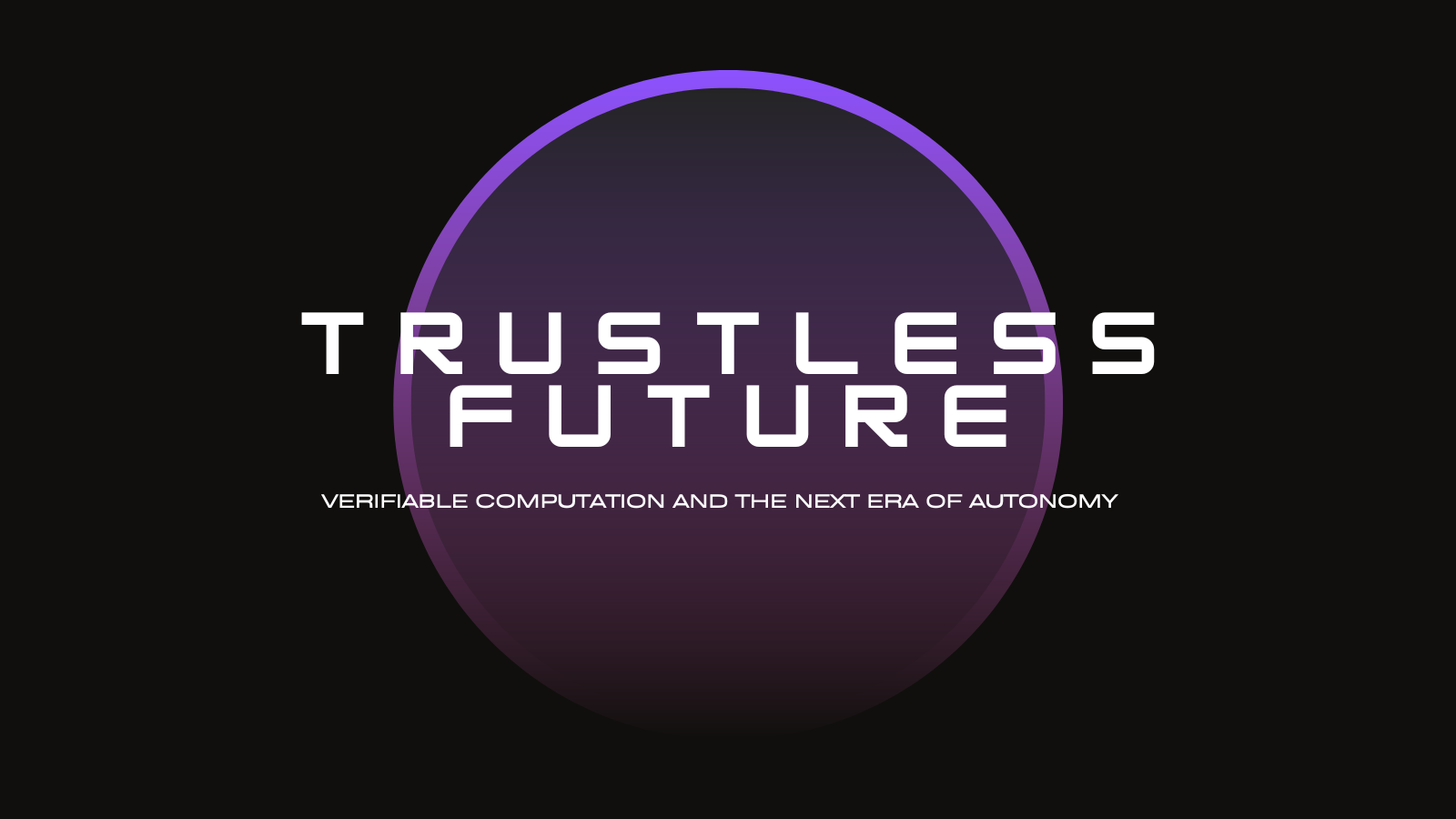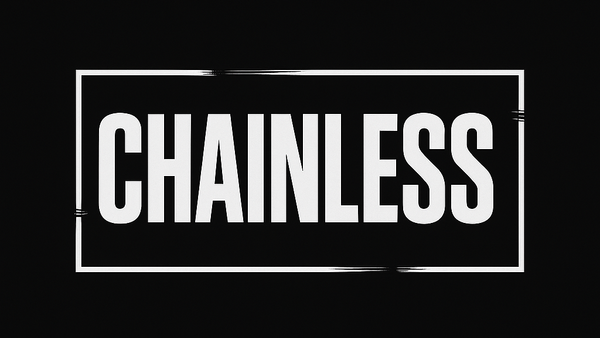The Trustless Future: Trustless Computation as the New Capital

Verifiable Computation and the Next Era of Autonomy
By default, trust is obsolete. The shift from centralized verification to cryptographic proofs is not a small step—it is a structural transformation. Trust has been an economic primitive for centuries, enabling transactions, governance, and institutions to function. But just as AI is replacing labor with capital, ZK technology is replacing trust with mathematical proof. This shift is not merely about efficiency; it redefines the very fabric of economic and social interactions, eliminating the need for intermediaries and securing transactions and computations through provable correctness.
Why Verifiable Computation is Inevitable
My journey into verifiable computation began with an obsession: fairness & autonomy. I started with SNZ where I was a ZK Researcher exploring zkVMs, then Aleo, exploring client-side proofs, then moved to Polygon to deepen my work. Aleo and Polygon Miden were pioneering zkVM technology, and I wanted to see how it could reshape computation and verification.
Working with zkVM projects like RISC Zero, Succinct, Valida, Jolt, Nexus, OpenVM, and Polygon Zisk, I saw firsthand how early-stage but fast growing this technology is. And I also saw its potential: computation that is inherently trustless and provable. The idea that computation could be validated cryptographically, rather than relying on institutional reputation, is an innovation comparable to the invention of double-entry bookkeeping in its capacity to transform accountability and trust in the digital age.
This belief comes down to two principles:
- Autonomous systems demand verifiability. A trustless society cannot function if every transaction needs human intervention. As automation and AI advance, verifiable computation is the only scalable solution to ensure accountability without bottlenecks.
- Privacy is essential for adoption. Public blockchains won’t scale to mass adoption unless privacy is ensured. Client-side proofs will redefine data ownership—people will own their data as they own their thoughts. This is critical for financial transactions, identity verification, and the broader application of digital rights.
Trustless Computation as the New Capital
Just as AI is replacing human labor, verifiable computation is replacing trust. This shifts power away from centralized institutions and embeds it directly into systems, making computation itself a fundamental unit of value. The consequences are profound:
- Verification without exposure. Users can prove facts about their data without revealing the data itself, ensuring privacy while enabling secure transactions. This changes how businesses, governments, and individuals interact, allowing for trustless verification in sensitive domains such as finance, healthcare, and digital identity.
- Elimination of intermediaries. Banks, notaries, and centralized identity providers will no longer be the sole arbiters of trust. Cryptographic proofs will facilitate transactions, contracts, and credentials without the need for third-party oversight. This removes friction from processes like loan approvals, cross-border payments, and business deals, reducing costs and increasing efficiency.
- Computation as an asset. AI-generated content, gaming logic, and financial models will no longer require centralized verification. Instead, they will be secured through cryptographic proofs, allowing computation itself to become a tradable and verifiable asset. Just as cloud computing revolutionized data processing, verifiable computation will create markets where computational tasks can be distributed, executed, and validated without reliance on traditional institutions.
- New economic paradigms. With computation becoming a fundamental, verifiable resource, entirely new economic models will emerge. Automated Multi-AI Agent services, automated governance, and smart contracts will rely on provable computation to function reliably, shifting power from gatekeepers to users. This will lead to an economy where value is based on cryptographic integrity rather than institutional endorsement.
Future Use Cases: Where Verifiable Computation Wins
1. Verifiable AI Inference
AI is opaque today. By integrating ZK proofs, AI models will produce cryptographic evidence of correct execution, making outputs verifiable and accountable. This is critical for AI safety, compliance, and fair decision-making. Governments and enterprises that rely on AI for critical decision-making will require proof that an AI model adhered to regulatory constraints and fairness guidelines.
2. Trustless Gaming with ZK Proofs
Gaming will become provably fair. zkVMs will generate ZK proofs of correct game state transitions, ensuring integrity in competitive gaming and autonomous game economies. Players will be able to verify that in-game economies and rewards are distributed fairly, without the risk of manipulation by centralized servers or game publishers.
3. zkID and zkTLS: A Trustless Bridge Between Web2 and Web3
Web2 data is controlled by platforms, limiting interoperability. zkTLS and zkID change this by enabling cryptographic proofs of web interactions without exposing personal data. Identity verification becomes privacy-preserving, shifting control from centralized authorities to individuals.
4. (Decentralized) Computation Networks
Projects like Lagrange, SP1 Provers Network, and RISC Zero’s Boundless are building decentralized computation layers, and some are building centralized ones. These will power verifiable, off-chain computation for DeFi risk assessments, AI, and privacy-focused applications. Imagine a world where cloud computing services no longer require trust in a service provider—every computation can be verified cryptographically.
The Last Defense Against AI: Verifiable Computation as a Constraint
AI’s unchecked power is a risk. In a verifiable computation context, AI’s actions will be cryptographically provable, ensuring alignment with human-defined rules. Black-box decision-making will become obsolete, preventing uncontrolled AI behavior. This will be particularly important as AI systems increasingly manage financial systems, healthcare decisions, and governance policies. A world where AI is bound by cryptographic verification is one where risk and unpredictability are minimized.
A Verifiable Future: Unlocking Human Potential
This is not a world of humans competing against machines—it’s a world where machines remove inefficiencies, allowing humans to focus on creativity and innovation. With trust removed as a bottleneck, we can build, explore, and create at an unprecedented scale. By removing reliance on opaque institutions, verifiable computation empowers individuals and trustless networks to operate in an environment where correctness is provable and disputes are settled objectively.
As trustless computation replaces human verification, the old power structures will fade. Instead of centralized control, fairness, security, and collaboration will define the digital age. This is not just an upgrade; it is a necessary shift toward a more resilient and transparent future. The potential applications extend beyond finance and AI—into governance, digital identity, intellectual property, and even social coordination.
The Takeaway: A World Without Trust is a World of Certainty
Trust is an inefficiency. ZK and verifiable computation eliminate this inefficiency, replacing it with provable, mathematical guarantees. This is not about marginal improvements—it is about a fundamental restructuring of how power and decision-making function.
Just as AI is eliminating human labor, ZK is eliminating trust-based gatekeepers. The result? A world with fewer human bottlenecks, where proof—not promises—drives progress. The transition to verifiable computation will not just be a shift in infrastructure—it will be a shift in power, ensuring a more accountable and trustless future.


![The [A-Z]app Paradigm - Trustless Apps with Web2 UX and Web3 Verifiability](/content/images/size/w600/2025/04/Blog-Banner--2-.png)